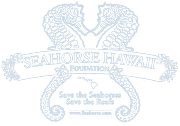Ocean Rider Seahorse Farm and Tours | Kona Hawaii › Forums › Seahorse Life and Care › Hippocampus erectus
- This topic has 2 replies, 3 voices, and was last updated 15 years, 10 months ago by Pete Giwojna.
-
AuthorPosts
-
September 14, 2008 at 8:27 am #1542AlmondsazMember
Hi Pete:
I have a female Hippocampus erectus and am concerned over the temps. The range of the chiller seems to keep the tank between 78-81. Is that going to create serious problems for her?
Thank you
David
Post edited by: Almondsaz, at: 2008/09/14 04:27
September 14, 2008 at 11:24 am #4457orianaGuestThe best temp. is 72 – 77 F. They are tropical/subtropical.
September 14, 2008 at 11:24 pm #4458Pete GiwojnaGuestDear David:
Yes, sir, I would be concerned in the long run if the water temperature in your aquarium is holding between 78°F-81°F. In my experience, Hippocampus erectus may begin to experience heat stress when the water temperature approaches 80° Fahrenheit or above for extended periods of time.
For best results with Mustangs and Sunbursts, I recommend maintaining stable conditions within the following parameters at all times:
Temperature = optimum 72°F-75°F (22°C-24°C).
Specific Gravity = range 1.022 – 1.026; optimum 1.0245
pH = range 8.0 – 8.4; optimum ~8.2
Ammonia = 0
Nitrite = 0
Nitrate = range 0-20 ppm; optimum 0-10 ppmI realize that the temperature range listed on the website is a bit broader than the water temp I recommend. The seahorses at the Ocean Rider aquaculture facility in Hawaii do just fine at a temperature of 78°F, but the conditions there are much different than in the average home hobby tank. At the seahorse farm, seahorses are maintained in very large, spacious holding tanks with natural seawater and natural sunlight. It’s an open system, and the water temperature never varies in the slightest.
In the home aquarium, they will be experiencing much different conditions in a small, close system aquarium that is subject to considerable temperature variations. The average aquarist’s seahorse tank is relatively small and uses artificial saltwater and artificial lighting, and the lighting is a heat source that can raise the temperature of the small aquaria significantly over the course of the day. More importantly, the smaller aquariums can experience harmful temperature spikes during summertime heat waves. In my experience, the home hobbyist should strive to maintain stable water temperatures in the 72°F-75°F range in order to compensate for these other factors. In general, as a rule, all seahorses do better at the lower end of their acceptable temperature range then at the upper end of their comfort zone, particularly in the small, closed system aquariums of the home hobbyist.
As you know, David, heat stress is extremely debilitating for seahorses and, in my experience, it is associated with more disease problems and mortalities in the home aquarium than any other factor. There are number of reasons for this. For one thing, elevated temperatures can have a very detrimental effect on the immune system of fishes. This is because many of the enzymes and proteins involved in their immune response are extremely temperature sensitive (Olin Feuerbacher, pers. com.). Some of these protective enzymes can be denatured and inactivated by an increase of just a few degrees in water temperature (Olin Feuerbacher, pers. com.). So when seahorses are kept at temperatures above their comfort zone, their immune system is compromised and they are unable to fend off diseases they would normally shrug off.
At the same time heat stress is weakening the seahorse’s immune response, the elevated temperatures are increasing the growth rate of microbes and making disease organisms all the more deadly. Research indicates that temperature plays a major role in the regulation of virulence genes (Olin Feuerbacher, pers. com.). As the temperature increases, virulence genes are switched on, so microorganisms that are completely harmless at cooler temperatures suddenly become pathogenic once the water warms up past a certain point. Thus both the population and virulence of the pathogens are dramatically increased at higher temperatures (Olin Feuerbacher, pers. com.).
In short, David, it would be a good idea to reduce the water temperature in your seahorse tank a few more degrees at least. This can probably be accomplished by reducing the photoperiod in the tank and removing the cover or hood from the aquarium. Or evaporative cooling can be used to drop the water temperature a few more degrees, as discussed below:
One simple way to drop the water temp in your aquarium is to position a small fan so it blows across the surface of the water continually (Giwojna, Oct. 2003). This will lower the water temperature several degrees through the phenomenon of evaporative cooling (just be sure to top off the tank regularly to replace the water lost to evaporation). Leaving the cover/hood and light off on your seahorse tank in conjunction with evaporative cooling can make a surprising difference. (A hood or cover tends to trap heat and hold it in the tank, so removing the voter cover from the aquarium can make a surprising difference in the water temperature, and is safe to do with seahorses since they do not jump at all.)
While reducing the water temperature via evaporative cooling, I should also caution you to observe all the usual precautions to prevent shocks and electrical accident when you are using an electric fan or any other electrical equipment on your aquarium, David.
One such precaution is to install an inexpensive titanium grounding probe in your aquariums. That will protect your seahorses and other wet pets from stray voltage and should also safeguard them electrocution in the event of a catastrophic heater failure or similar accident..
But the best way to protect you and your loved ones from electrical accidents around the fish room is to make sure all the outlets are equipped with Ground Fault Circuit Interrupters. And it’s a good idea to make sure all your electrical equipment is plugged into a surge protector as well to further protect your expensive pumps, filters, heaters, etc. from damage. Some good surge protectors, such as the Shock Busters, come with a GFCI built right into them so you can kill two birds with one stone. So when you set up your cooling fan(s) on the aquarium, be sure they’re plugged into a grounded outlet with a GFCI or a surge protector with GFCI protection.
Best of luck cooling down the water temperature in your seahorse tank a bit more, David. Here’s hoping that your female H. erectus continues to thrive and your setup, sir!
Respectfully,
Pete Giwojna -
AuthorPosts
- You must be logged in to reply to this topic.





